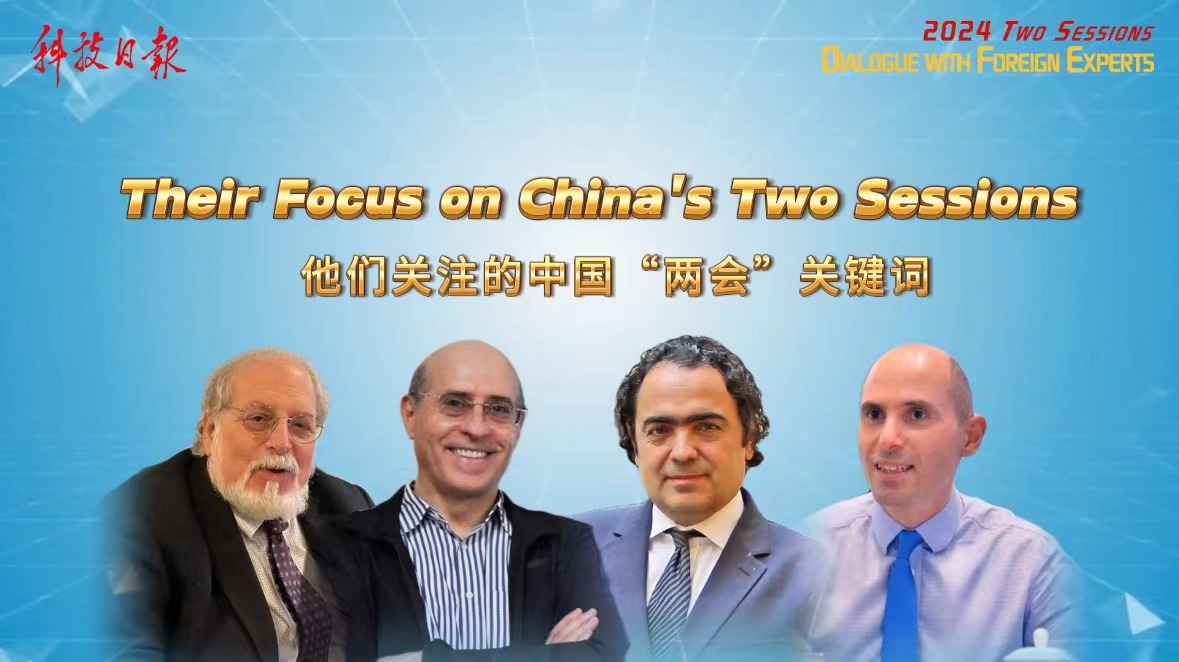Their Focus on China's Two Sessions

Denis Simon,?Francesco Faiola,?Henry H. Radamson,?Steven Back (from left to right, COURTESY PHOTO)
Editor's Note:
As the Two Sessions have convened, Science and Technology Daily is privileged to present insights from nine foreign experts who have shared their perspectives on four themes, namely, Innovation, Openness, Sustainability and Inclusiveness.
These interviews provide a multi-dimensional look at China's strides in promoting Chinese modernization. Through these expert insights, we hope to foster a deeper understanding of the development and cooperation opportunities that lie ahead, not just for China, but for the global community as a whole.

New Quality Productive Forces: Invigorating High-quality Development
The term, "new quality productive forces" was first put forward by President Xi Jinping?during his inspection tour, in September 2023, to northeast China, the country's old industrial base, and refers to a new form of productive forces derived from continuous sci-tech breakthroughs and innovation that drive strategic emerging industries and future industries in a more intelligent information era.
Regions across China have intensified their efforts, since the beginning of this year, to nurture strategic emerging industries and future industries. This is part of a broader initiative to cultivate new quality productive forces and discover new avenues for growth.
According to Xinhua, Beijing plans to launch 100 sci-tech innovation and modern industrial projects, including NEV industry clusters and the health and medicine industry this year.
Italian scientist Francesco Faiola commenting on Beijing's rapid transformation into an international innovation center said, "It also promotes high-quality development of new R&D institutes, supporting leading enterprises in establishing innovation consortia, and breaking through core technologies in key fields. These efforts aim to create an open innovation ecosystem with global competitiveness."
This newly coined term shows China's commitment to bolstering its domestic innovation landscape and enhancing its capacity for international cooperation and partnership in cutting-edge sectors.
Recently, some experts have become more aware of China's greater focus on sci-tech innovation. "With its new emphasis on innovative capacity and capabilities, Chinese leaders are hoping to move China's economic activity into new higher value-added segments of the global economy," said American scholar Denis Simon, adding that, "China will play much less of a reactive role in global economic affairs, but rather it will increasingly shape the nature of global competition."
Simon also sees the global implication of the China-proposed concept. From his perspective, China should prove to be an increasingly attractive partner for collaboration and cooperation with the shift towards "new quality productive forces."
As new strategic emerging industries play a more central role in defining the terms and conditions of competitive and development priorities, China's new emerging areas of competitive strength should make its role as a transborder strategic partner more important, said Simon.
Based on these trends, he expects to witness a period in which collaborative partnerships with Chinese researchers become much more mainstream.
Making 'Beautiful China' a Reality
To build a "Beautiful China," the country is improving its biodiversity conservation policies and creating a new framework for sustainable development. Many foreign experts who have lived in China for a long period are witnesses to the country's significant progress in ecological conservation over the past decade, confirming the success of China's approach in harmonizing ecology and economy.
Michael Crook, who has lived in Beijing for more than 50 years and is one of the founders of the Western Academy of Beijing, is very impressed by China's environmental protection and responsible ecological policies, especially in the areas of biodiversity, clean energy and pollution management. As China expands its infrastructure projects and builds cement roads to connect most rural villages with the outside world, environmental protection remains a top priority, said Crook, citing his own Xizang travel experience in 2023, where the environment is not disturbed at all by the construction of roads and railways.
The use of clean energy, such as electricity and solar power, has helped drive China's transition to a low-carbon economy and plays a key role in the global fight against climate change, said Swedish scientist Henry H. Radamson, a full-time researcher at the Institute of Microelectronics, CAS. "Chinese electric cars are running almost everywhere in the world," he said. "While others are still talking, China has gone ahead and done it." Crook also spoke highly of China's clean energy boom, which serves as an example to the entire world.
Francesco Faiola, an Italian professor at CAS, has seen firsthand China's efforts to prevent pollution at its source. As his research focuses on the effects of pollutants on human health, Faiola pays special attention to China's environmental protection and pollution management. "I strongly believe that China will achieve its dual carbon target, even though they're quite ambitious, because China has invested a lot of money and effort in green development," he said.
"China has not only done a great job for itself, but it's leading the way and helping the world become a better place," said Crook, hoping that China's experience will be shared globally, in the same way as its electric cars are being exported.
International cooperation?key to sci-tech advancement
In recent years, China has significantly expanded its openness and collaboration in the sci-tech sector, building upon its 46-year journey of reform and opening-up, which shows the nation's commitment to fostering an open and inclusive research environment.
A magnet for international talent
"I think China is the best place for promoting research, motivating young people, and gaining governmental support in research," said German expert ?mer Sahin Ganiyusufoglu, an industrial development consultant at Qingdao International Academician Park. He noted China's long-term strategic vision and potential in advancing research and development.
This is aptly demonstrated by Italian scientist Francesco Faiola, who in 2014 became the first full-time foreign researcher at the Research Center for Eco-Environmental Science of the Chinese Academy of Sciences (CAS).
"One of the primary motivations is the ability to access world-class research facilities and resources, which can increase productivity and efficiency in research and development," said Faiola.
Beyond professional opportunities, China has streamlined the integration of international experts into its society. This includes simplifying visa processes and offering comprehensive support services for foreign experts, further proving that China is a welcoming hub for global talent.
A win-win for global collaboration
China has made great strides in scientific fields, such as artificial intelligence, quantum computing, space science and environmental sciences. These have not only marked its breakthroughs but have also attracted international experts keen on joint research, which fully proves that China's rise as a sci-tech power provides opportunities instead of threats to global progress.
British scientist Peter Taylor from Tianjin University said, "A rising tide floats all boats and progress benefits everyone," adding that "Breakthroughs made in China and made known through publications and talks can be used in other countries to benefit their activities."
Faiola also highlighted these mutual benefits, saying, "Foreign researchers and institutions are eager to join their Chinese counterparts in sci-tech advancements, presenting numerous opportunities for joint research projects." He further emphasized the dual advantages of such collaborations: scientific progress and economic benefits.
Getting access to the vast Chinese market through collaborations offers foreign researchers and institutions opportunities, such as joint ventures. "These incentives foster a more collaborative and productive relationship, ultimately benefiting both parties in advancing science and technology," he said.
Echoing this, Denis Simon, a distinguished fellow at the Institute for China-American Studies, reflected on China's substantial progress in the sci-tech sector, noting its crucial role in addressing global challenges like climate change. "There is no global problem whose meaningful solution will not require ample Chinese participation," said Simon, adding "The days of the 'Lone Ranger' in international sci-tech affairs no longer exist."
Pursuing self-reliance while opening doors wider
China's 14th Five-Year Plan for Economic and Social Development (2021-2025) also stated that China will implement a more "open, inclusive, mutually beneficial and shared" strategy for international sci-tech cooperation, and will more "actively integrate into the global innovation network."
Simon said that not only is China's central government highly active in promoting cross-border collaboration, but also many provincial and municipal governments are increasing their international cooperation.
According to Henry H. Radamson, a Swedish scientist working at CAS, China's openness is not just lip service. "China has made its space station an open platform for international cooperation. Many countries are participating in the experiments in China's space station," he said. As of 2023, there had been nine projects involving some 17 countries and 23 entities selected among the first batch of scientific experiments to be carried out on the station.
"China is dedicated to its peaceful development, fostering global friendships and cooperating with countries around the world," said Ganiyusufoglu. He further said, "China is willing to share its knowledge, expertise, and talent with the world."







